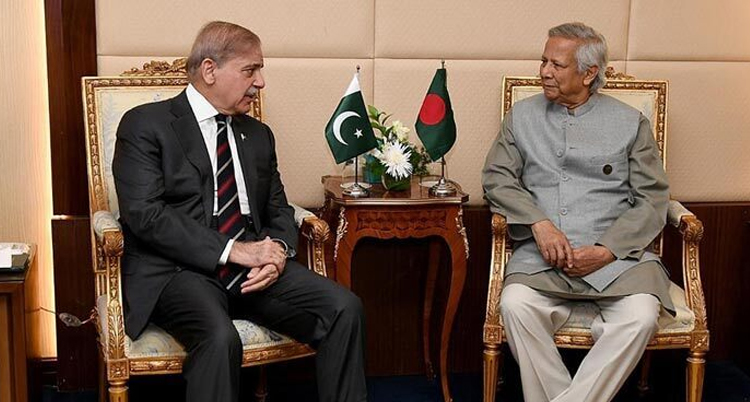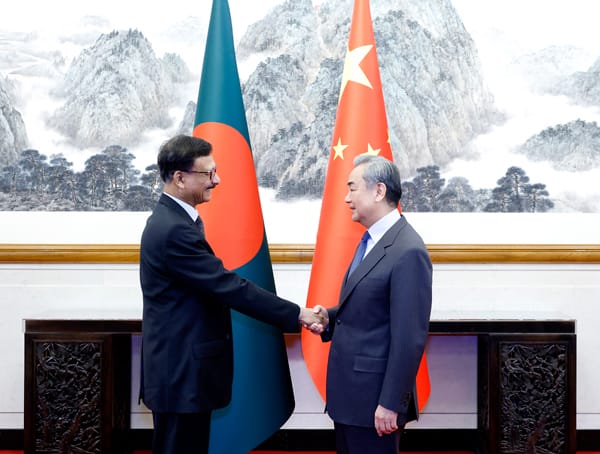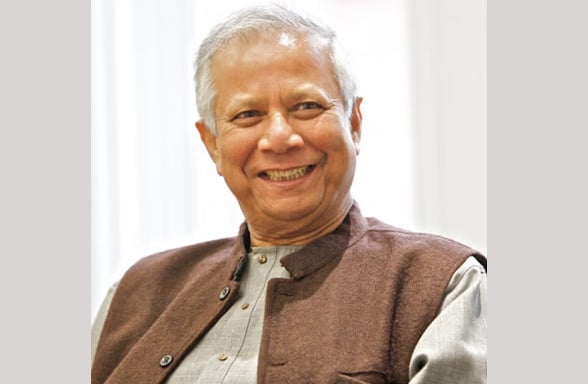
Online Desk: Relations between Bangladesh and Pakistan are experiencing a historic thaw following the ouster of Prime Minister Sheikh Hasina in August. Official exchanges between the two nations are increasing, and the Pakistani government, along with business groups, hopes to raise annual trade with Bangladesh to $3 billion-more than four times the current level-within a year, reports Nikkei Asia.
Bangladesh, formerly East Pakistan, gained independence in 1971 after a war of liberation. Ties between Dhaka and Islamabad have been tense whenever Hasina and her Awami League were in power, but relations improved under Bangladesh Nationalist Party-led governments. Relations reached a historic low after Hasina’s third term began in 2014, but her removal from power has created an opportunity for a reset.
Pakistan`s Prime Minister Shahbaz Sharif and Bangladesh`s Chief Adviser Muhammad Yunus, leader of Bangladesh`s interim government, met twice last year at global events. On Jan. 14, Gen. S.M. Kamrul Hassan, a high-ranking Bangladeshi military officer, visited Islamabad to meet with Pakistan`s army chief, Gen. Asim Munir.
Another high-profile exchange was the visit by a delegation from the Federation of Pakistan Chambers of Commerce and Industry (FPCCI), Pakistan`s top trade body, to Bangladesh last week. This was the first visit by a trade delegation in over a decade, and the group met with Bangladesh`s commerce minister, officials from the Dhaka Chamber of Commerce and Bangladeshi business people.
During the trip, a memorandum of understanding was signed to form the Pakistan-Bangladesh Joint Business Council. The Pakistani delegation called for a free trade agreement between the countries.
“The minister of commerce of Bangladesh told us that Bangladesh prefers Pakistani businesses for imports,” said Saqib Fayyaz Magoon, senior vice president of FPCCI, who was part of the delegation.
“Bangladesh only has a textile and plastics industry, and they have to import the rest of the products for their 200 million [person] market.” He added, “This has opened a door for us, which was previously unavailable” because of Hasina`s hostile government.
Magoon revealed that Bangladesh has already placed an order for the import of 50,000 tonnes of rice and 25,000 tonnes of sugar for immediate use, with more to follow. Bangladesh is also considering importing dates from Pakistan.
Bilateral trade between Pakistan and Bangladesh currently stands at just $700 million a year.
“With the removal of nontariff barriers, we expect that Pakistan`s [annual] trade volume with Bangladesh will reach up to $3 billion within one year,” Magoon told Nikkei Asia. “We can target many commodities such as rice, sugar, oil, cotton yarn and ladies` clothes,” he added.
“The last significant boost to trade relations occurred in July 2002, when [then]-Pakistan President Pervez Musharraf visited Dhaka,” said Moonis Ahmar, professor of International Relations at the University of Karachi. “Recent dialogues between the FPCCI and Bangladeshi stakeholders signal a potential revival of trade ties.”
Another major development is the resumption of a direct maritime route connecting the port of Karachi in Pakistan with Chittagong in Bangladesh. The route had been dormant for 52 years, but restarted in November. “This [resumption] is expected to facilitate trade and may eventually include passenger ships, offering a cost-effective travel alternative via Colombo [in Sri Lanka],” Ahmar said.
The two countries are exploring the possibility of resuming direct flights, which have been suspended since 2018.
Dhaka has also made it easier for Pakistani nationals to get visas, as the high commissioner of Bangladesh to Pakistan, equivalent to an ambassador, announced on Jan. 12. “We got our visas within a few hours. This is a major change in the attitude of Bangladesh`s government towards Pakistani businessmen,” Magoon of the FPCCI told Nikkei.
Rafiuddin Siddiqui, high commissioner of Pakistan to Bangladesh from 2016 to 2018, said during Hasina`s government, it was nearly impossible for a Pakistani citizen to get a visa.
“We had no access to government officials in Bangladesh back then. The relations between Islamabad and Dhaka were in a deep freeze as long as [Sheikh Hasina] Wajid was in power,” he said. “The recent developments are a phenomenal change in Pakistan-Bangladesh relations.”
Experts said domestic political factors under Hasina`s government were behind the deterioration in ties with Islamabad.
“Sheikh Hasina Wajid was reluctant to open up with Pakistan, as her political strategy involved criticizing Pakistan and associating opposition forces in Bangladesh with Pakistan to consolidate her external support, primarily from India,” Qamar Cheema, executive director of the Sanober Institute, an Islamabad-based think tank, told Nikkei.
“Following the regime change in Bangladesh, there was a natural appetite between Pakistan and Bangladesh to engage in dialogue,” he added.
Pakistani trade leaders are urging the government to seize the opportunity created by the new government in Dhaka by making quick policy decisions. “Pakistan`s economic policies should be based on bulk production for targeting the 200 million market of Bangladesh,” Magoon suggested. “The government of Pakistan should reciprocate the Bangladesh government`s policy of ease in the issuance of visas,” he added.







